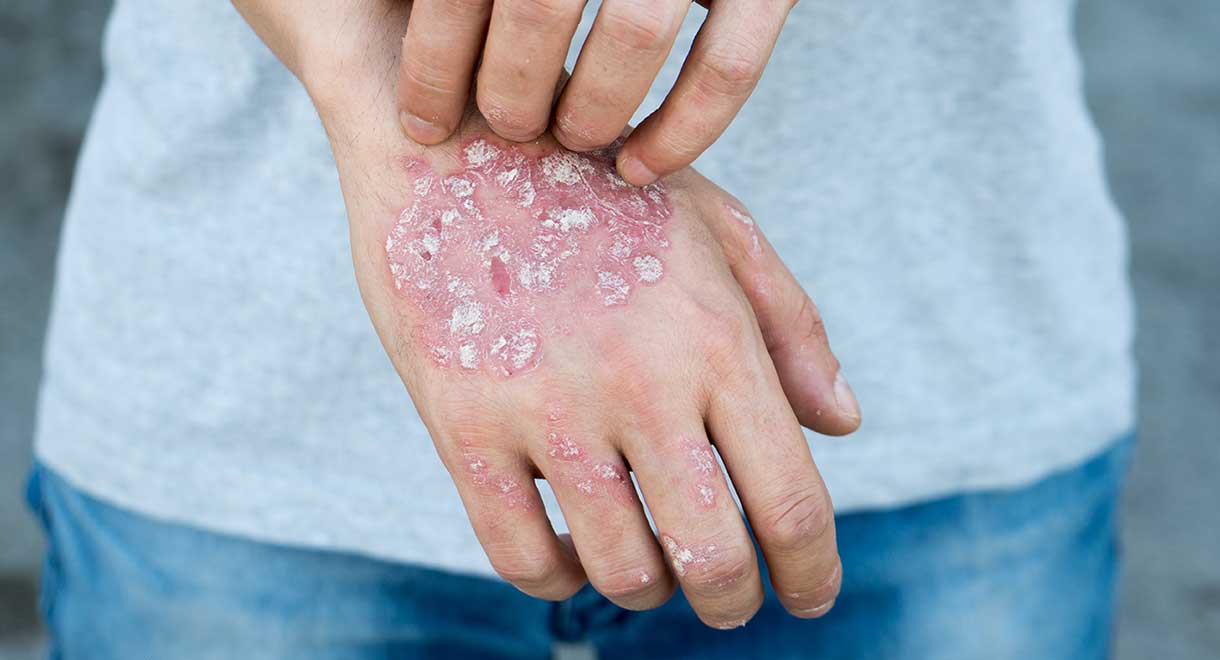Psoriasis
Psoriasis is an autoimmune disease which presents as a chronic skin condition that appears as salmon pink patches covered with a silvery scale. It appears particularly over the elbows, knees and scalp. It occurs when the skin cells divide and proliferate too quickly, piling up into a thick scale. The nails may also be affected becoming rough and pitted. In some people it becomes a generalised inflammatory disease and attacks the joints causing arthritis.
What causes psoriasis?
Psoriasis is a complex hereditary condition but may be exacerbated or triggered by:
- Environmental factors such as trauma to the skin
- Certain drugs like lithium, anti-malarials, and beta-blockers
- Infections including streptococcal throat infections, viral hepatitis and HIV
- Excess alcohol consumption
- Stress – patients commonly point out the role of stress in psoriatic flare ups. The psoriasis itself can be a significant stressor.
Who gets psoriasis?
Psoriasis is not contagious. It can occur at any age but commonly presents for the first time in the late teenage years (16 to 22) or late middle-age (57 to 60 years). Unpredictable periods of high activity and remission of the condition may occur. In fact, 50 percent of patients will undergo spontaneous remission, which may last from several weeks to many years.
Arthritis (joint inflammation) occurs in association with the skin disease in around 8 percent of psoriasis sufferers.
Treatment and general recommendations
- Avoid trigger factors like excess alcohol and lack of sleep.
- Moderate sunlight exposure (about 20 minutes a day) is frequently helpful, as ultra-violet light inhibits the activity of cells in the skin.
- Some people find that heat therapy in the form of heating pads or hot baths resolves skin lesions.
Diet
- Poor liver function will exacerbate psoriasis so follow the principles of the liver cleansing diet. The liver is the major ‘filter’ of the blood stream and breaks down toxic chemicals that could inflame the skin.
- Include cold-water fish like herring, mackerel, salmon and tuna, chia and hemp seeds, coconut flesh and cream and avocados, which are rich in the anti-inflammatory fatty acids. These are excellent for reducing inflammation of the skin.
- Include high fiber foods like raw fruits and vegetables, legumes, nuts and seeds. This is because a low fiber diet increases the levels of endotoxin-producing bacteria in the bowel, and psoriasis is associated with high levels of these endotoxins.
- Avoid gluten and dairy products, as outlined in the book “Healing Autoimmune Disease”.
- Drink 1 to 2 liters of water daily.
Raw juicing
Freshly made raw vegetable juices are most helpful. Appropriate recipes for psoriasis may be found in my “Raw Juices Can Save Your Life” book, like:
Immune Booster Smoothie
Ingredients
- 3 apricots (fresh or dried if not in season) or 1/2 cup berries
- 1 small ripe banana
- 1 tsp glutamine powder
- 1 tbsp ground chia or hemp seeds
- 1 passionfruit
- 1 cup sugar free milk – coconut, almond or rice milk
Method
- Put all ingredients in blender and blend thoroughly.
Skin Healing Juice
Ingredients
- 1 carrot
- 1 red apple – skin on
- 1/4 beetroot and tops
- 2 sticks celery and tops
- 1/2 cucumber
- 2 spinach or dandelion leaves
- 1 grapefruit or orange (retain as much white pith as possible)
Method
- Wash, trim and chop and process in juicer.
Orthodox medical treatment
It is important that patients understand the nature of psoriasis and that treatment is suppressive but not curative. Following this, some patients may be happy with no treatment. However, although they may have no itch or irritation, many psoriasis sufferers find the skin lesions socially embarrassing. Fortunately, orthodox medicine can offer treatments that are very effective in clearing the skin. The most common treatments are various lotions, ointments, creams and shampoos including tar-based treatments, dithranol, salicylic acid, corticosteroids and calcipotriol (derived from vitamin D). Phototherapy using ultraviolet light is often very effective, but has the inconvenience of requiring frequent attendances for the treatment, and the long term worry regarding UV exposure causing skin cancers and premature aging of the skin. For very severe cases, drugs such as methotrexate or cyclosporin may be used. These can have some rather toxic side effects and should only be prescribed by a specialist dermatologist.
Recommended supplements for psoriasis
- Selenomune
Take 1 capsule daily – Selenium is an important mineral helping to support immune function and reduce inflammation. You will see the difference in your skin after 2 to 3 months. - MSM Plus Vitamin C
Take 1 teaspoon twice daily in water or juice – MSM is needed to work at a cellular level and is a cleanser of the blood and skin. - Vitamin D
Take 3000 to 5000 I.U. daily with food. Vitamin D helps to reduce inflammation.
The above statements have not been evaluated by the FDA and are not intended to diagnose, treat or cure any disease.


Leave A Comment